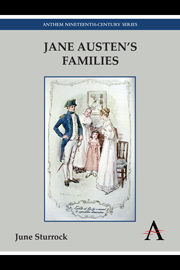Book contents
- Frontmatter
- Table of Contents
- Acknowledgements
- References and Abbreviations
- General Introduction
- Part I Family Dynamics
- Introduction
- Chapter One The Functions of the Dysfunctional Family: Northanger Abbey, Sense and Sensibility, Pride and Prejudice
- Chapter Two Spoilt Children: Pride and Prejudice, Mansfield Park and Emma
- Chapter Three “Usefulness and Exertion”: Mothers and Sisters in Sense and Sensibility, Mansfield Park, Emma and Persuasion
- Part II Fathers and Daughters
- Conclusion: “Creative Attention”
- Notes
- Select Bibliography
- Index
Chapter Two - Spoilt Children: Pride and Prejudice, Mansfield Park and Emma
from Part I - Family Dynamics
- Frontmatter
- Table of Contents
- Acknowledgements
- References and Abbreviations
- General Introduction
- Part I Family Dynamics
- Introduction
- Chapter One The Functions of the Dysfunctional Family: Northanger Abbey, Sense and Sensibility, Pride and Prejudice
- Chapter Two Spoilt Children: Pride and Prejudice, Mansfield Park and Emma
- Chapter Three “Usefulness and Exertion”: Mothers and Sisters in Sense and Sensibility, Mansfield Park, Emma and Persuasion
- Part II Fathers and Daughters
- Conclusion: “Creative Attention”
- Notes
- Select Bibliography
- Index
Summary
All Jane Austen's novels, to various degrees, explore the problem of the spoilt child – and the spoiling parent – and its effect on family dynamics: consider Isabella Thorpe, Marianne Dashwood, Lydia Bennet, the Bertram sisters, Betsy Price, Elizabeth Elliot and of course Emma Woodhouse. The different kinds of spoiling shown in the various novels are threads in their respective interweavings of significant issues: for instance, Tom Bertram and his sisters are spoiled by the largely materialist values of Mansfield Park (values discussed in Chapter Four), while Elizabeth Elliot is spoiled by the mindless vanity and narcissism of the father she so closely resembles (qualities discussed in Chapter Six).
Austen's treatment of the spoilt child is especially striking in the three novels published in three consecutive years that are the focus of this chapter – Pride and Prejudice (1813), Mansfield Park (1814) and Emma (1815). The interconnection between these three novels is apparent in several ways. In terms of chronology, it seems highly probable that Austen was revising Pride and Prejudice during the long period when she was working on Mansfield Park, the novel that immediately precedes Emma. In this series of novels, Jane Austen responds, as was indeed her habit, to each previous achievement not by producing more of the same, but by providing counter-models, which work as antidotes to any over-simplistic understanding of the characters and situations she has already explored in earlier novels.
- Type
- Chapter
- Information
- Jane Austen's Families , pp. 33 - 46Publisher: Anthem PressPrint publication year: 2013



